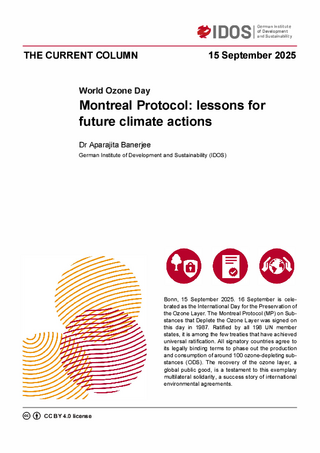World Ozone Day
Montreal Protocol: lessons for future climate actions
Banerjee, AparajitaThe Current Column (2025)
Bonn: German Institute of Development and Sustainability (IDOS), The Current Column of 15 September 2025
Bonn, 15 September 2025. 16 September is celebrated as the International Day for the Preservation of the Ozone Layer. The Montreal Protocol (MP) on Substances that Deplete the Ozone Layer was signed on this day in 1987. Ratified by all 198 UN member states, it is among the few treaties that have achieved universal ratification. All signatory countries agree to its legally binding terms to phase out the production and consumption of around 100 ozone-depleting substances (ODS). The recovery of the ozone layer, a global public good, is a testament to this exemplary multilateral solidarity, a success story of international environmental agreements.
Currently, Small Island Developing States, along with Pakistan, are making bold calls to develop a Fossil Fuel Non-Proliferation Treaty (FF NPT). Similar to the Montreal Protocol, this treaty will mandate a phase-out of the production and consumption of fossil fuels within a timeframe. Many state and non-state actors, including cities such as Bonn, have endorsed this call. The European Parliament has also requested that member states develop the treaty. While these voices are growing and huge hurdles lie ahead, what are the pertinent lessons from the success of the Montreal Protocol that can inform the FF NPT process? Admittedly, the challenge of phasing out fossil fuels is greater than banning ODS and not all success factors of the Montreal Protocol can be replicated in the FF NPT.
First, the role of public awareness and acceptance is critical. In the 1980s, scientific evidence was inconclusive about the true nature of ultraviolet radiation's impacts on human lives. Even the causal relation between certain ODS and ozone layer depletion was unsettled. However, within 2 years of the discovery of the hole in the ozone layer over Antarctica, the Montreal Protocol was negotiated and ratified. Environmental activists and the scientific community collaborated to create widespread public awareness. Harm to human health took precedence over the impact of stringent environmental regulations on ODS using and manufacturing industries. Even developing countries, where ODS provided cheap cooling and refrigeration, on boarded. The message was clear: ODS was harmful and needed to be abandoned.
A Multilateral Fund was established under the Montreal Protocol, co-governed by equal representatives from both developing and developed countries. The purpose of the Fund was to assist countries in phasing out the use of ODS in refrigerant and cooling technologies. The MF was also mandated to bear the cost of research and knowledge transfer of non-ODS using technologies. As not all countries were similarly equipped to transition from ODS at the same time, progressive phase out plans were developed for gradual decoupling. The Montreal Protocol included provisions for flexibility, allowing countries to develop their own phase-out commitments within established timelines.
Similarly, public awareness today is key for the FF NPT. Ample scientific evidence now exists on the harmful impacts of air pollution from fossil fuel combustion on human health. While restricting a 1.5 degree global temperature rise under the Paris Agreement may sound like a far-fetched goal with interrelated trade-offs and barriers, phasing out new fossil fuels for their human health impacts is a simpler message. As the Paris Agreement does not explicitly mention phasing out fossil fuels, there is a necessity for a new global treaty with a singular purpose of restraining fossil fuel production and use. Such targeted focus can generate public support from the bottom up to counter the strong fossil fuel lobby.
Greater public awareness can build pressure on policymakers to commit to plans for a fossil fuel phase-out by setting specific targets, achieved over the short and medium terms. Similar to MF, a fund can be created to help countries in their transition, which would also fund the costs of research, development, and technology transfers. An additional role of the fund could be to develop a comprehensive understanding of the social, economic, and political challenges associated with phasing out fossil fuels in various social, economic, political and historical contexts and to suggest just and equitable policy options to pursue.
For many, an FF NPT may sound like utopia in the current political context. However, the Montreal Protocol provides a great example of how, with the right commitments, collective action problems can be addressed. Big ideas start with a belief in their possibilities. One by one, hundreds of cities, from Bonn to Kolkata, Kingston to Paris, and Lima to Toronto, have begun to believe in this possibility and endorse the FF NPT. It is time to build a greater groundswell of public support and work on the many details to develop the FF NPT, as a last effort to phase out fossil fuels before it is too late.

